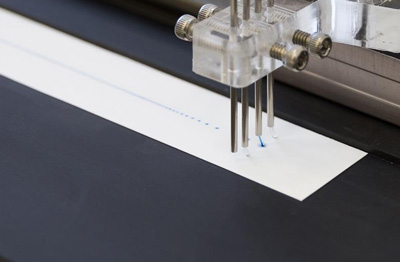ImmuStick: a rapid test that detects pyrogens in food
- Like
- Digg
- Del
- Tumblr
- VKontakte
- Buffer
- Love This
- Odnoklassniki
- Meneame
- Blogger
- Amazon
- Yahoo Mail
- Gmail
- AOL
- Newsvine
- HackerNews
- Evernote
- MySpace
- Mail.ru
- Viadeo
- Line
- Comments
- Yummly
- SMS
- Viber
- Telegram
- Subscribe
- Skype
- Facebook Messenger
- Kakao
- LiveJournal
- Yammer
- Edgar
- Fintel
- Mix
- Instapaper
- Copy Link
Posted: 5 July 2016 | Victoria White, Digital Content Producer | No comments yet
Researchers are developing a test which rapidly identifies bacteria, fungi or viruses and can be used in situ without laboratory equipment…


Researchers at the Fraunhofer Institute for Interfacial Engineering and Biotechnology IGB are developing a test which rapidly and cost-effectively identifies bacteria, fungi or viruses.


Application of immune receptors onto the test strip. CREDIT: Fraunhofer IGB
It can be carried out directly in situ without laboratory equipment and specialist knowledge and, according to the researchers, could be a useful tool for the food industry.
The researchers say method works as simply as a pregnancy test. The ImmuStick is a test strip onto which a few drops of fluid are applied. If the fluid contains pyrogens, fragments of pathogens, this is shown by a coloured strip in a viewing window. First of all, human immune receptors sensitive to certain pyrogens are applied to the surface of the stick. During production, at the docking point of the immune receptors to which the pyrogens normally bind, a type of placeholder is mounted which is marked with a dye.
ImmuStick works like a pregnancy test for pyrogens
When drops of a fluid containing pyrogens are then applied to the test strip, the pyrogens rush to the docking point on the immune receptor. The placeholders marked with the dye migrate with the fluid through the test strip until they are visible in the viewing window. The colour signal thus indicates that pyrogens that have docked on the immune receptors are present.
The researchers envisage applications in the food sector, as a complete absence of germs or pyrogens is required there. As pyrogens also include certain allergy trigger factors, an application here would also be conceivable. In the food industry it is important that products are free of allergens. With the ImmuStick these could be detected quickly, cost-effectively and simply. Costly and laborious laboratory tests would therefore no longer be needed or could be supplemented. At present the IGB researchers are seeking cooperation partners who want to further develop the ImmuStick to make it ready for the market.
Related topics
Related organisations
Fraunhofer Institute for Interfacial Engineering and Biotechnology IGB









